Rokmer Pharma Deepens Engagement at Teshie OTCM Meeting: Bridging Access and Awareness in Community Healthcare
Teshie, Accra – April 2025 — As part of its ongoing commitment to strengthening healthcare delivery at the community level,...

Teshie, Accra – April 2025 — As part of its ongoing commitment to strengthening healthcare delivery at the community level,...
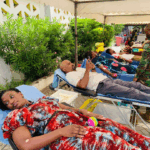
The Young Christian Workers Movement (YCWM) of Christ the King Catholic Church has reaffirmed its commitment to saving lives by organising its annual blood donation exercise in partnership with health institutions, drawing dozens of voluntary donors to support the country’s urgent need for blood.
The initiative forms part of YCWM’s longstanding mission to contribute to national health efforts and encourage a culture of voluntary blood donation among the youth and wider community.
The movement has been at the forefront of this life-saving campaign for over fifteen years.
Held on Sunday, the blood donation exercise brought together parishioners and health professionals at the forecourt of Christ the King Catholic Church in Accra.
Medical staff from the 37 Military Hospital were on-site to assist donors and ensure the smooth running of the event, which saw enthusiastic participation from first-time and regular donors alike.
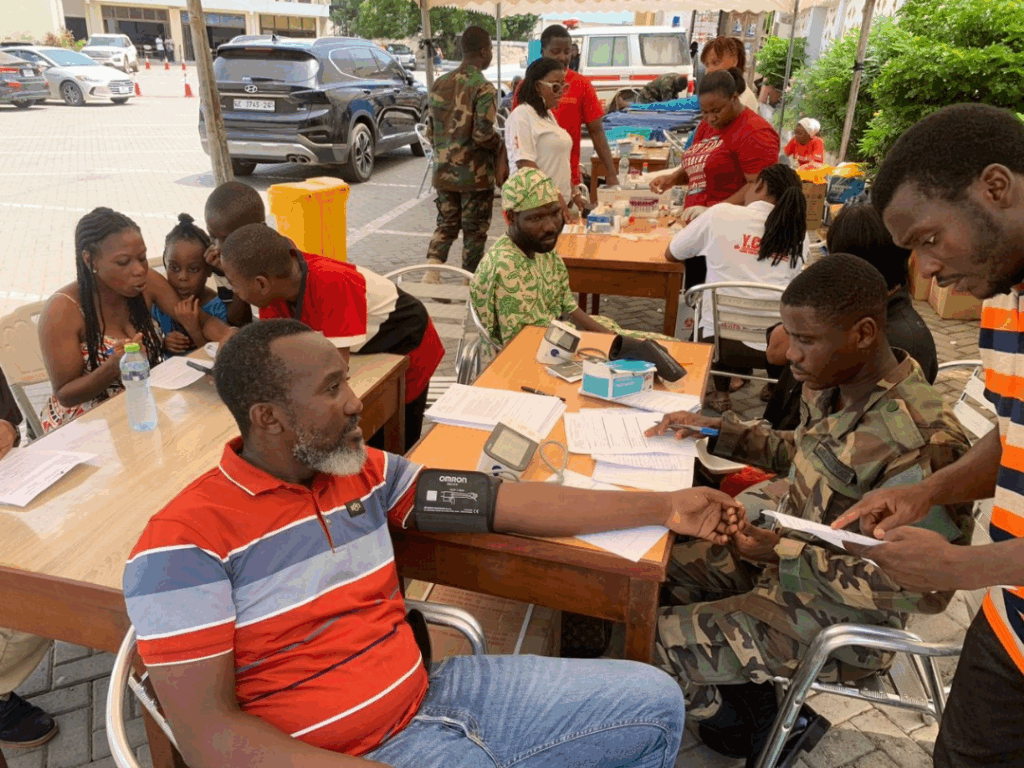
Speaking during the event, Flight Lieutenant Rashid Bashiru, a Medical Laboratory Scientist with the Blood Bank Department at the 37 Military Hospital, urged Ghanaians to embrace voluntary blood donation as a lifesaving civic duty.
“A single unit of donated blood can save up to three lives. Blood is essential to human survival, and donating even twice a year could save up to six lives annually,” he said in an interview with the media.
He emphasised the need for individuals to take personal responsibility in supporting the national blood supply encouraging citizens not to wait for special campaigns but to visit nearby hospitals and donate regularly.
The President of the Young Christian Workers Movement, Ms. Lucy Dzata, highlighted the group’s longstanding support for blood donation efforts adding that “for more than fifteen years, we have been organising these drives to help maintain adequate blood supplies in our hospitals. It is our way of giving back and ensuring that no life is lost due to the lack of blood.”
Some of the donors at the event shared personal motivations for participating, expressing their desire to contribute to saving lives and encouraging others to follow suit.
The YCWM continues to play a vital role in promoting health and community service in Ghana, and their partnership with the 37 Military Hospital underscores the importance of collaborative efforts in strengthening the country’s healthcare system.

A landmark international study led by Member of Parliament for Abuakwa South, Dr Kingsley Agyemang, has uncovered a significant shortfall in obesity intervention research across Sub-Saharan Africa (SSA).
The study, titled “Effectiveness of Obesity Interventions in Sub-Saharan Africa: A Systematic Review and Meta-Analyses”, was published recently in PLOS ONE, a Q1-ranked, peer-reviewed journal of high impact.
It highlights the urgent need for context-specific public health strategies, warning that although obesity rates across Africa are rising rapidly, the continent lacks sufficient local evidence to drive effective policy and intervention.
Conducted as part of an international collaboration, the research reviewed over 419,000 academic records but identified only seven eligible studies, all originating from South Africa. This startling finding underscores the critical lack of regional data from other Sub-Saharan African countries and signals an urgent call to action for more inclusive research across the continent.
At the forefront of this pioneering effort is Dr Agyemang, whose unique dual role as legislator and academic places him in a strategic position to bridge the gap between research and policymaking in Ghana and beyond. His leadership has been instrumental in drawing national and regional attention to the growing obesity crisis.
“Sub-Saharan Africa is battling an epidemic of obesity, yet we lack the necessary evidence base to guide our policies and interventions,” Dr Agyemang remarked. “We must craft solutions that are context-specific and culturally sensitive to address this crisis head-on.”
The meta-analysis revealed that structured physical activity programmes—particularly those combining aerobic and resistance training—led to a significant reduction of approximately 34% in overweight and obesity rates.
However, these interventions had a statistically insignificant effect on waist circumference, a key marker of abdominal obesity.
Given the narrow geographical scope of the studies, Dr Agyemang issued a firm call for wider, country-specific research efforts. “Our findings offer only a limited perspective,” he cautioned. “The fact that all qualifying studies were based in one country shows the scale of the challenge.
Much of sub-Saharan Africa remains in a data vacuum when it comes to evidence-based obesity prevention.”
In addition to physical activity, the study assessed other interventions such as health education and micronutrient supplementation. However, the limited data available prevented conclusive assessments of their long-term effectiveness.
The review also revealed a widespread lack of sustainability planning across existing interventions—an area that must be urgently addressed.
Professor Peter Agyei-Baffour, Dean of the School of Public Health at KNUST, praised the study as a forward-thinking contribution with major public health implications. “With obesity posing a threat not only to health outcomes but also to economic development in SSA, we can no longer afford to rely on borrowed models,” he said. “This study is a critical step towards developing our own robust evidence base.”
The findings have begun to gain traction in both public health and policy circles, positioning Dr Agyemang as a leading voice at the intersection of science and governance. His role as MP provides a crucial platform for translating research insights into legislative action.
“This is not just about academic research,” Dr Agyemang concluded. “It is about applying knowledge to influence policy, protect communities, and create healthier futures for our people.”
The full study is available upon request and stands as a valuable resource for academics, practitioners, and policymakers working to design and implement effective obesity interventions across sub-Saharan Africa.
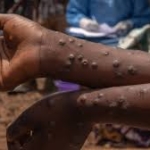
The Ghana Health Service (GHS) has confirmed 10 new cases of Mpox, formerly known as Monkeypox, bringing the country’s total case count to 19.
According to health officials, five of the confirmed cases are currently on admission and are receiving treatment. No fatalities have been recorded so far in the latest outbreak.
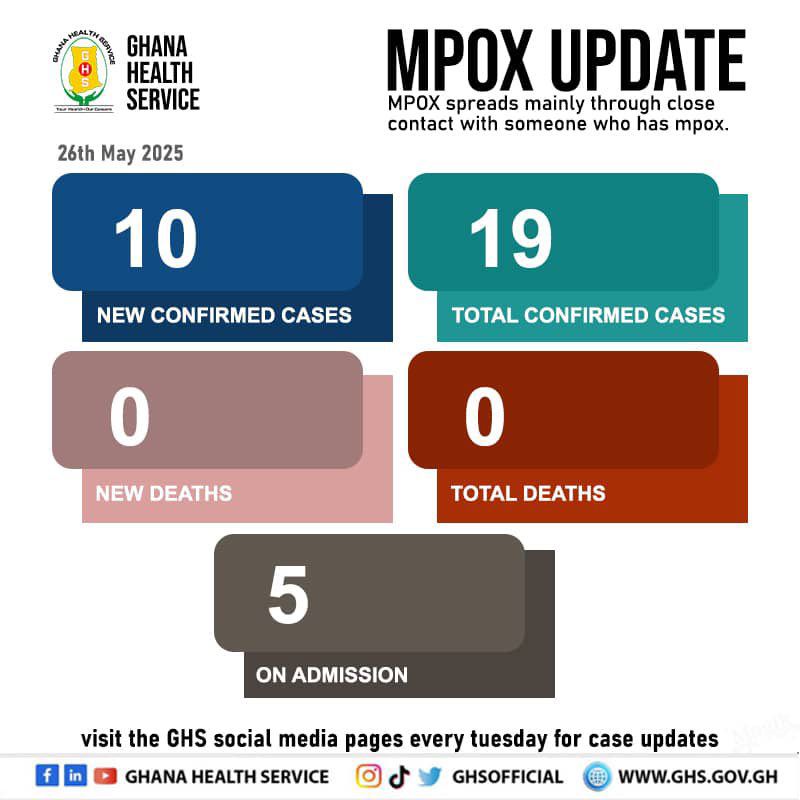
The GHS has assured the public that it is actively monitoring the situation and has intensified surveillance measures across the country, particularly in affected areas.
Mpox, a viral zoonotic disease related to smallpox, typically presents with symptoms such as fever, intense headache, swollen lymph nodes, back pain, muscle aches, and skin rashes. It is transmitted from person to person through close contact with lesions, body fluids, respiratory droplets, and contaminated materials such as bedding.
In countries such as the Democratic Republic of Congo (DRC) and Nigeria, Mpox remains endemic, with intermittent surges in cases, often exacerbated by gaps in healthcare infrastructure, inadequate public health education, and challenges in rural surveillance.
The DRC, in particular, continues to report the highest number of cases globally, underscoring the need for a coordinated regional strategy.
The World Health Organization (WHO) has recently called for increased investment in Mpox diagnostics, vaccine research, and public education campaigns across Africa, warning that the virus could spread further if not contained effectively.
WHO also advocates for de-stigmatising public discourse around Mpox to ensure that affected individuals are not marginalised or deterred from seeking care.
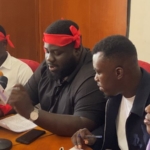
The Coalition of Unemployed Allied Health Professionals Association of Ghana (COUAHP) is furious over the government’s failure to employ thousands of qualified health professionals who have remained jobless since 2019.
They include trained Medical Laboratory Scientists, Physiotherapists, Radiographers, Health Information Officers, Disease Control Officers, Community Mental Health Officers, Nutritionists, and Dietitians.
The aggrieved group is decrying what members describe as neglect and systematic discrimination, despite critical shortages in public health facilities.
The over 30,000 aggrieved youth demand immediate recruitment, transparent timelines, and a national policy to avert nationwide protests.
Medical Laboratory Professional Workers’ Union (MELPWU) recently called on the Ministry of Health, Ministry of Finance, and other stakeholders to immediately address the long-standing delay in recruitment of allied health professionals.
Despite this call, the Coalition of Unemployed Allied Health Professionals Association of Ghana (COUAHP) has noticed the non-responsiveness and is demanding immediate posting.

Members of the coalition wrapped their heads and hands with red bands to register their displeasure for what they term as “injustice”.
The group says that despite fulfilling all professional requirements, their employment has lagged for over six years.
Public Relations Officer of the Coalition, Hussein Abdul-Baaki, is blaming the government for unfair demands for professional license renewal which has increased their financial hardship.
“Despite completing our mandatory national service, passing our licensure examinations, and remaining committed and ready to serve the nation, many of us have remained unemployed as far back as 2019. This is a disturbing reality in a country where public health facilities are plagued with chronic staff shortages, particularly in the areas of diagnostics, disease surveillance, rehabilitation, and health information management.
“Adding to the injustice, we are required by law to renew our professional licenses annually at a significant personal cost even though we are not employed and not permitted to practice. This is deeply unfair and further exacerbates the emotional, psychological, and financial hardship we are already burdened with,” he said.
The aggrieved unemployed professional group is demanding immediate recruitment and clear national intervention for sustainable employment terms that ensure regular employment for allied health graduates.
They announced that a delay in response to their plea will result in a nationwide protest.
“We demand immediate financial clearance and recruitment of all qualified but unemployed Allied Health professionals from 2019 to date. An end to recurring bureaucratic bottlenecks that frustrate the employment process. Clear timelines and full transparency from the Ministry of Health and Ministry of Finance on recruitment plans.
“We need a comprehensive national policy for sustainable health workforce planning, equitable recruitment, and investment in human resources for health. Equal and fair treatment of Allied Health professionals in all health sector decisions. If no decisive action is taken to address this issue, we will embark on a massive nationwide demonstration to demand our right to employment, fairness, and dignity,” said Hussein.
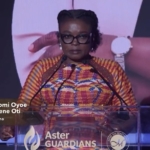
Head of Nursing at the National Radiotherapy, Oncology and Nuclear Medicine Centre at Korle-Bu Teaching Hospital in Accra, Naomi Oyoe Ohene Oti, has been named the winner of the prestigious 2025 Aster Guardians Global Nursing Award.
The award, which comes with a prize of $250,000, recognises exceptional nurses from around the world who have demonstrated outstanding dedication, innovation, and impact in the field of healthcare.
Mrs. Oyoe Ohene’s victory is a proud moment for Ghana and a powerful tribute to the vital role of nurses in cancer care and beyond.
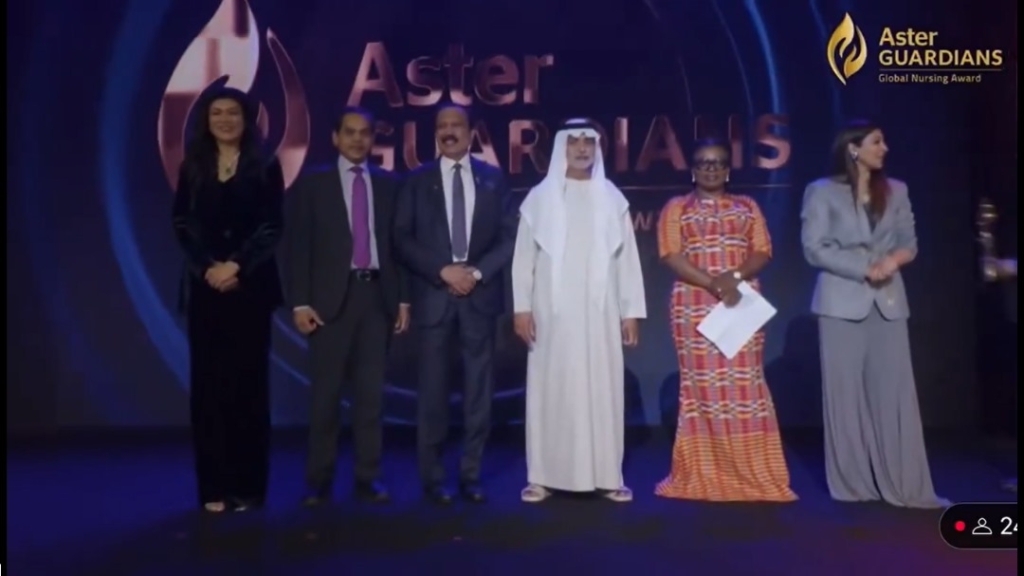
Speaking after receiving the award in Dubai on Monday, May 26, she expressed deep gratitude and reflected on her professional journey.
“Over two decades ago, I began my nursing journey with a simple mission to ease pain, bring hope and walk alongside those battling cancer. In Sub-Saharan Africa, I have witnessed firsthand inequities in cancer care, especially in under-resourced communities, but I have also seen the immense potential of nurses to lead transformative change,” she said.
She was earlier shortlisted as one of the top 10 finalists from across the globe, selected from thousands of nominations.
Her work at Ghana’s foremost oncology centre has been widely commended for its compassionate care, clinical excellence, and advocacy for improved cancer treatment in the country.
She said, “My passion for oncology nursing was born out of a desire to bridge this gap and deliver compassionate, high-quality care to those who need it most.”

Her recognition not only highlights her personal achievements but also shines a light on the critical contributions of oncology nurses in Ghana’s healthcare system. Her efforts have helped bridge gaps in palliative care, enhanced patient support systems, and promoted awareness of early cancer detection and treatment.
The Aster Guardians Global Nursing Award is an initiative of Aster DM Healthcare, aimed at honouring nurses who have gone above and beyond in their duties to care, heal, and innovate. Mrs. Oyoe Ohene’s win places her among a distinguished cohort of global health professionals whose work is transforming lives daily.
According to her, “This award affirms it more, dreams and empowers me to do even more. It is more than recognition, it is a catalyst for lasting change. I am committed to using it to amplify the voice of African nurses and expand access to cancer care, and build a legacy of leadership and excellence in oncology nursing across our continent (Africa).”
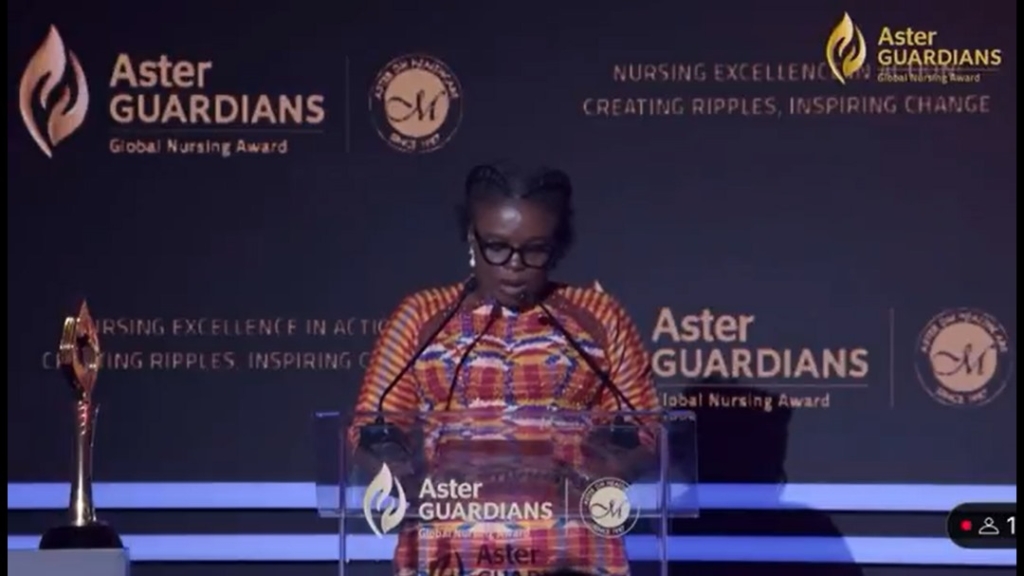
As Naomi Oyoe Ohene Oti brings the award home, she carries with her not just international acclaim, but the hopes of many who continue to believe in the power of care to change the world.
The Aster Guardians Global Nursing Award, one of the most distinguished recognitions in the nursing profession, received over 100,000 registrations from nurses across 199 countries.
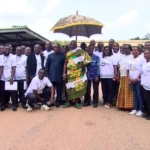
Some members of the Herbal Manufacturers Association of Ghana have commenced processes to convert liquid mixtures into other modernized medications.
Pharmaceutical grade capsules, tablets and repositories are among the modern forms the medication will take.
This is part of measures to improve efficacy and standardize dosage for consumers.

The move is in response to training in modern means of herbal medicine production received from the Herbal Medicine Department of the KNUST’s School of Pharmacy and Pharmaceutical Sciences.
President of the Herbal Manufacturers Association of Ghana, Dr. Solomon Appiah Kubi explains the manufacturers have received improved knowledge in plant extraction to improve their produce.
“We are no longer just powdering the plant materials and putting them into shells, we are doing the extraction, granulation so we can do tableting or capsulation,” he said.
With this process, dosage of products will be standardized to compete on the international market.
Over the years, most herbal medicines are produced in liquid mixtures.
Though effective, users will have to use the medication over some time before realizing the needed results.
Some herbal medicine manufacturers are envisaging an improvement in the products in the near future.
Dr. Amuzu of Amuzu Herbal Clinic believes, “our medication will be more effective and portable to carry around. It will be kept neat as well. Medication with duration for treatment marked fourteen days will be reduced to three days.”
Aside from extraction, herbal materials processing and modernization of the products, the herbal medicine manufacturers were also trained in prevention of microbial and toxic metal contamination.
Dr. Appiah Kubi has emphasized the implementation of the training received forms part of processes to attain International Standard Organisation’s certification for locally-manufactured herbal medicines.
The Herbal Medicine Department of KNUST has committed to furthering training on documentation as part of a roadmap towards meeting ISO certification.
Head of Department, Prof. Isaac Kingsley Amponsah has revealed a lot will be done towards meeting ISO certification.
“ISO has certain requirements they will have to meet. This will require re-engineering of their entire production facility, work flow and more importantly their documentation,” he added.
Meanwhile, the School of Pharmacy and Pharmaceutical Sciences at KNUST has assured to further monitor the herbal medicine sector and design programs to meet their needs.
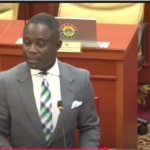
A health professional in the Nkwanta North District, Edmond Amos Ameamu, is concerned over he says is “deteriorating infrastructure” that is crippling healthcare delivery in the area.
He is calling for urgent intervention from government and stakeholders to address the crisis.
Mr. Ameamu, who has served in the district for over 14 years, says persistent power outages and low voltage are severely affecting critical services, especially the storage of vaccines and the safe delivery of babies at night.
“Midwives running night shifts have to depend on torchlights to conduct deliveries, putting the lives of both mother and child at risk,” he stated in an open letter to stakeholders.
He revealed that the absence of backup generators is undermining the district’s cold chain system, raising serious concerns about vaccine potency.
“Refrigerators, fans, and even bulbs cannot function efficiently. Food preservation has become nearly impossible,” he added.
Mr. Ameamu also lamented the deplorable state of roads in the district, particularly the Nkwanta to Kpassa stretch.
He explained that poor road conditions are delaying emergency responses and putting patients at further risk.
“A journey that should take 20 minutes now takes more than an hour,” he said.
The health worker further decried poor telecommunication services, noting that weak network connectivity hampers coordination among health professionals and affects timely communication with patients during emergencies.
He is appealing to authorities to invest in renewable energy solutions, fix the road network, and upgrade telecommunication infrastructure to ensure that residents of Nkwanta North have access to reliable and efficient healthcare.
Mr. Ameamu’s call underscores the urgent need for systemic improvements to protect lives and support frontline health workers in the district.
Read his letter below;
OPEN LETTER TO STAKEHOLDERS IN NKWANTA NORTH
Dear Friends and Stakeholders,
As a dedicated health professional and convener serving the people of Nkwanta North in the Oti Region for the past 14 years, I’m writing to share the daily struggles we face in delivering quality healthcare. Electricity, water, a good road network and security are basic needs for every citizen in Ghana, including health professionals. Undeniably, all these basic needs mentioned in the district are either deficient or not available. Frequent power outages and low current supply are crippling our efforts and must be looked at immediately.
Our cold chain system where potency of Vaccines heavily depends on is highly questioned in the absence of backup generators. Midwives running night shift have to depend on flashlights (touch lights) to conduct delivery, putting the lives of both baby and mother at a preventable risk. You can imagine what these mothers go through travelling on these roads with a term pregnancy and on arrival at the health facilities, faced with different sets of challenges because of power outages and low voltage. Means of food preservation using refrigerators are things of the past because the light that is given in a few minutes cannot efficiently power bulbs, talkless of powering refrigerators. Poor telecommunication challenges are better not touched on.
The Human Impact
Imagine being unable to store life-saving vaccines because our refrigerators can’t function without reliable power. Picture emergency responders struggling to reach patients in time due to potholed roads that slow them down. Imagine you losing your baby because that midwife becomes so helpless due to a sudden blackout during the second stage of labour. This isn’t just about equipment or infrastructure; it’s about people’s lives. What of that healthcare professional who is struggling to rest after a long day, stressed because of the inconveniences caused? Will she be able to think straight the next day to render satisfying services to the lives she is assigned to serve? As the saying goes, “a sound mind in a sound body”, there is no doubt that these professionals may not be able to effectively serve the citizenry because they are not sound in the kind of environment they find themselves in. To reiterate, most of these professionals are no longer using their refrigerators, fans, televisions and other gadgets that require sufficient power to operate them.
Our Challenges
• Power Outages: Unstable power supply is affecting our medical equipment, vaccine storage, personal lives at homes and overall ability to provide care under this hot scotching sun.
• Poor Telecommunication: Network issues are delaying communication with patients and colleagues, slowing down our response times to attend to emergency issues.
• Road Network: The condition of our roads is a major obstacle for emergency responders and patients alike. A distance that should be covered in 20minutes is now covered in more than an hour. More especially with the Nkwanta to Kpassa road.
A Call to Action
I appeal and urge the authorities and stakeholders to prioritise solutions. Investing in renewable energy, upgrading our telecommunication infrastructure, and improving our roads would make a huge difference. It’s time for us to work together to create a healthcare system that truly serves our community.
Colleagues working in urban areas and other rural settings that have the above-mentioned challenges receive same training and salary as those in the Nkwanta North districts and other districts faced with similar challenges. We plead that these will be given the urgent attention to enable the professionals to render the services that are required of them.
Thank you
Sincerely,
AMEAMU EDMOND AMOS
Convener, Health Professional
Nkwanta North, Oti Region
amosameamu@gmail.com

Jahara Osman was a child with questions no one could answer. Restless in school and misunderstood at home. She was not disobedient. She was just different. But like many Ghanaian children navigating undiagnosed conditions, she was never given the words to understand what was happening in her mind.
Now, as founder of the Premier Rehabilitation Centre and a passionate mental health advocate, Jahara is working to ensure that other children, parents and adults do not remain silent in their suffering.
“As someone who grew up in an environment where mental health was never spoken about, my parents had no idea what or how to define my behaviour or how I approached life. It was a general treatment amongst all my siblings.”

“So I find passion in educating parents, especially parents with children that are on the spectrum – autism, ADHD, bipolar, and all other mental health conditions – on how to go about understanding the behaviour, picking up the little clues, because you would know more than any practitioner or doctor would, because you spend more time with your child than any doctor. So you being able to identify it would be the initial step to making your child’s life a lot easier,” she indicated.
That silence, she says, is costing lives and dignity.
On Saturday, 31st May, 2025, Jahara will host The Mental Health Forum, a nationwide gathering at the Accra International Conference Centre, aimed at breaking that silence once and for all. The event will feature panels with doctors, religious leaders, mental health survivors and wellness professionals. But more than that, it will open the floor for everyday Ghanaians to speak their truths.

“So I think that the government needs to put in a lot more. I know they’re trying. Just like I thought a year and a half ago, we had the National Health Insurance include mental health and psychology in the insurance, free insurance for people, which is a wonderful job. But I think we need to do more because access to psychologists and therapy is very, very difficult and expensive, especially for people who cannot afford it. We really need to bridge a gap where we have easy access to therapy and psychological or psychiatric help,” Jahara Osman said.
Jahara’s advocacy is deeply personal. Diagnosed later in life with Attention-Deficit/Hyperactivity Disorder (ADHD) and autism spectrum disorder, she spent years navigating a system that did not understand her. That experience fuelled her commitment to support those who do not fit into society’s ‘normal’ boxes.

“I think we understand that we have a mental health crisis. For us to have speciality hospitals that are dedicated to mental health means that we are aware of the situation. I understand that we are actually also struggling with funds in different aspects of the medical facilities and hospitals we deal with.”
“But what we have to understand is that mental health is the core foundation of every disease. If you’re not mentally stable, you can get any sickness from just not being mentally stable. It’s like the base of everything. So let’s focus on getting our own brain, our own functions, to a stable level, and we will find out that a lot of these diseases we suffer from will just eliminate themselves.”
The forum, which is free and open to the public, will also kick off a new campaign: bringing mental health education to churches, classrooms and company boardrooms across Ghana.
The initiative comes at a time when mental health issues are rising globally, and Ghana is not immune. From exam-related stress among teens to burnout among professionals and trauma among survivors of abuse, the spectrum is wide and growing. But access to care remains low and stigma his igh.
Support for Jahara’s work is coming from all corners – including the Ministry of Health, the Mental Health Authority and private foundations invested in youth development and public wellness.
The forum will be broadcast live on JoyNews at 12 noon.
If you have ever felt overwhelmed, confused or emotionally stuck, this forum is for you.